Activists, families of death row prisoners protest outside Tehran prison
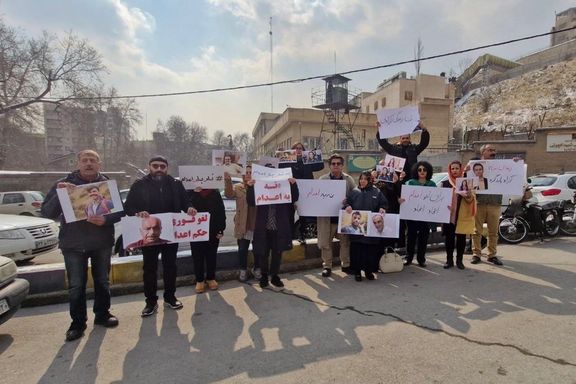
Activists and families of political prisoners on death row staged a protest outside Tehran's Evin Prison on Tuesday, calling for the abolition of capital punishment in Iran.

Activists and families of political prisoners on death row staged a protest outside Tehran's Evin Prison on Tuesday, calling for the abolition of capital punishment in Iran.
The demonstration began early in the morning and was attended by former political prisoners and human rights activists, including filmmaker Jafar Panahi and Nobel Peace Prize laureate Narges Mohammadi who appeared without wearing the mandatory hijab in defiance of the country's strict dress laws.
Protesters held placards reading "No to execution," "Immediate repeal of death sentences," and "Political prisoners must be freed."
Participants displayed images of political prisoners sentenced to death, demanding the cancellation of their executions and their unconditional release.
On Monday, France-based rights group Kurdistan Human Rights Network (KHRN) reported that a protestor detained during Iran's Woman Life Freedom uprising, sparked by the death in custody of Mahsa Amini over an alleged hijab law violation, was sentenced to death.
Last month, US-based rights group HRANA, at least 54 political prisoners are currently facing execution across various prisons in Iran.
Iran has faced increasing international criticism for its widespread use of the death penalty, especially against political prisoners and activists.
The United Nations human rights office reported in January that Iran in 2024 executed 901 people, including 31 women, marking record highs.
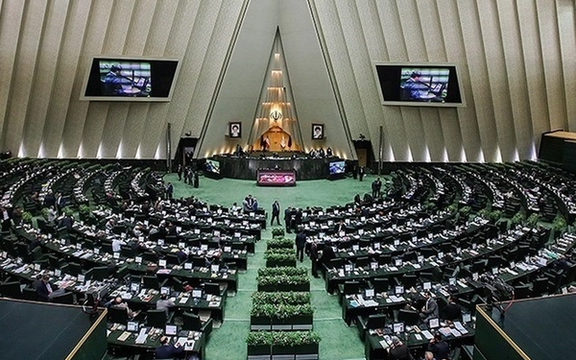
The National Security and Foreign Policy Committee of Iran’s Parliament said that while negotiation remains a valid diplomatic tool, talks with the United States have consistently harmed Iranian interests.
“Negotiation with the US is not prohibited but has proven irrational and damaging,” the committee said, referencing past engagements with Washington.
It pointed to the 2015 nuclear deal, or JCPOA, as an example, listing extensive commitments Iran undertook—ranging from reducing enriched uranium stockpiles to converting nuclear facilities—while saying the US failed to deliver on sanctions relief.
Instead, sanctions increased, culminating in the Trump administration’s withdrawal from the deal in 2018, the statement added.
The commission said that engaging with the US has eroded trust, citing recent sanctions for Iran's support of regional militant groups, domestic human rights abuses and support for Russia's war on Ukraine.
They described the US as a “hostile and arrogant regime.” A member of the commission said, “Negotiating with such entities brings no rational benefits; it only deepens the damage.”
It echoes the messaging from the country's Supreme Leader Ali Khamenei, who, during a recent Friday address, said, “Negotiations with the United States have no impact on solving the country’s problems.”
His remarks come as divisions emerge among Iranian officials regarding potential talks on a new nuclear agreement. While some figures, like President Masoud Pezeshkian, have expressed openness to renewed discussions, Khamenei dismissed the idea, emphasizing self-reliance over external agreements.
Iran’s economy has suffered significant setbacks since the reinstatement of US sanctions in 2018. The national currency has devalued by 95%, inflation has remained at around 40% for five years, and over a third of the population now lives below the poverty line.
However, the committee stressed that these challenges should be addressed by fostering domestic production and strengthening ties with regional allies, rather than pursuing dialogue with an “untrustworthy adversary.”
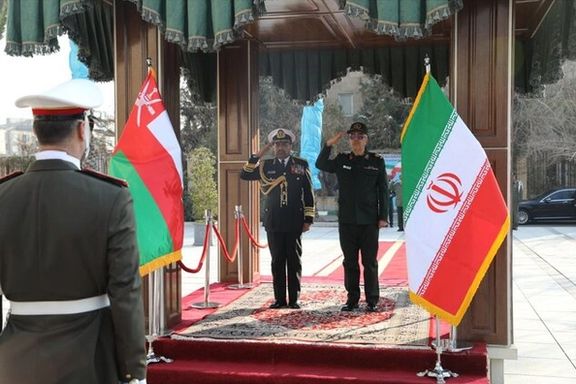
Omani and Iranian military chiefs met in Tehran on Tuesday as the two nations prepare for military drills.
Oman's chief of staff, Abdullah bin Khamis Al Raisi, arrived in Tehran on Monday at the invitation of his Iranian counterpart, Mohammad Bagheri.
Iranian state media said during the visit, Al Raisi is expected to tour an exhibition of Iran's military capabilities and meet with senior Iranian military commanders.
Last week, Iran's IRGC navy chief announced there will be ongoing drills with other countries neighboring Iran such as Oman.
"We have had engagements with Oman's navy in this regard and have participated in joint drills with Oman," he said.
Oman has been a key ally to Tehran, one of the players helping to mediate a rapprochement with Saudi Arabia which resumed diplomatic ties with Iran in 2023 after a seven year blackout.
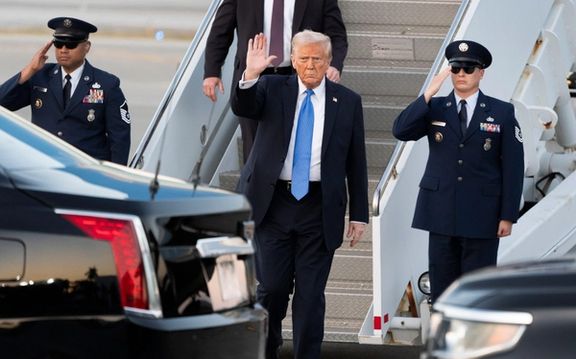
Iran is terrified after losing almost all its air defenses and now would love to make a deal with the United States, Donald Trump said on Monday, adding that he would also prefer a deal with Tehran to an Israeli attack on their nuclear sites.
"Iran is very concerned. Iran is very frightened, to be honest with you, because their defense is pretty much gone," Trump told Fox News.
He was apparently referring to Israel's October attacks on Iran which, according to US officials, knocked out the country's last three Russian-provided S-300 air defense missile systems.
"Maybe they are trying to get new defense as we speak but their defense is largely gone... Iran is very nervous. I think they're scared. I think Iran would love to make a deal and I would love to make a deal with them without bombing them," Trump added.
Israeli officials have repeatedly raised the possibility of military action against Iran’s nuclear program, but Trump has insisted that he hopes a deal over Iran's nuclear program would make it so that the United States did not have to support an Israeli attack on Iran.
"Everybody thinks Israel with our help or our approval will go in and bomb the hell out of them," Trump said Monday, stressing that Israel would need the US support for such a strike.
"I would prefer that not happen. I'd much rather see a deal with Iran where we can do a deal, supervise, check it, inspect it."
Earlier he had said that any reports the United States and Israel would work together on a devastating military attack on Iran were overblown.
"I want Iran to be a great and successful Country, but one that cannot have a Nuclear Weapon. Reports that the United States, working in conjunction with Israel, is going to blow Iran into smithereens,” ARE GREATLY EXAGGERATED," Trump said on February 5.
'Iran is very militant'
Trump has long opposed foreign wars but has adopted a hard line on Iran, beefing up sanctions on its oil exports in his first term and pulling out of an international deal on Tehran's disputed nuclear program, known as the Joint Comprehensive Plan of Action (JCPOA).
"That was the dumbest" deal, Trump said. "And by the way, that would have expired by now. That was a road to a nuclear weapon. It was a short-term deal. You can't make a deal with just a few years on it."
Trump was referring to the so-called sunset clauses of the 2015 nuclear deal which, according to him, would enable Iran to pursue nuclear weapons in the future.
"They would have a legal right to have a nuclear weapon. You cannot allow Iran or just about anybody else by the way but especially Iran because they are very, very militant. You can't allow them to have a nuclear weapon," he told Fox News.
Trump said there are two ways to stop Tehran from developing a nuclear weapon: "With bombs or with a written piece of paper. And I'd much rather do a deal that's not going to hurt them. And I think they want it too."
Iran has denied seeking a nuclear weapon, but Israel has long contended that a bomb in the hands of its arch-enemy poses an existential threat.
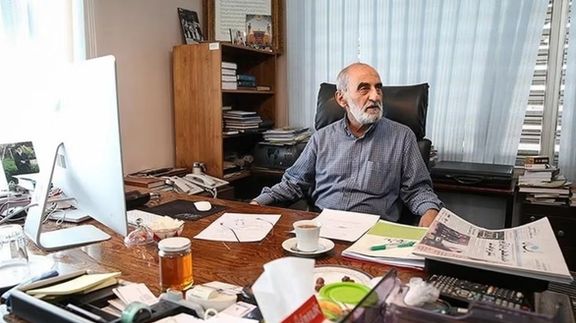
The hardline Kayhan newspaper which is overseen by Iran's Supreme Leader has yet to comply with a court ruling requiring the return of a sizable tract of public land, according to a whistleblower journalist.
The land dispute involving a body at the heart of Iranian establishment illuminates the controversy around alleged land grabs involving well-connected people and institutions.
Centering on 200 hectares in Damavand near Tehran, the case dates back to 1996, three years after longtime editor Hossein Shariatmadari was appointed as Ali Khamenei’s representative at the Kayhan Institute overseeing the newspaper.
According to the journalist Yashar Soltani, at the time, the government transferred the land for tree farming and grazing. However, subsequent legal changes challenged such allocations.
“On November 25, 1996, Gholamreza Forouzesh, the minister of agriculture, approved the allocation of 200 hectares of land to the Kayhan Institute. The land was intended for the construction of a township to consolidate all of the institute's publications, as well as for a printing house and administrative facilities.
"However, it was later transferred to the institute under the vague and general pretexts of livestock farming,” said a report by Soltani.
A law passed in 2003 mandated that land transfers made after 1985 without provincial commission approvals must be reversed if the intended projects had not materialized.
Following this, the ministry of agriculture pursued legal action in several cases, including the Kayhan land deal.
In 2007, a court ruled that the land deed should be invalidated and converted into a lease, yet the institute has refused to recognize the decision.
Despite the law’s explicit language, officials from Tehran’s Natural Resources Directorate have been unable to enforce the ruling.
Tehran's Friday prayer leader, Kazem Sedighi, another appointee of the supreme leader, has faced scrutiny in the wake of allegations that he and his family purchased a valuable 45,200 sq ft plot in northern Tehran.
Khamenei presents his office as incorruptible and apart from any financial peccadillos of officialdom but is Iran's ultimate source of authority.
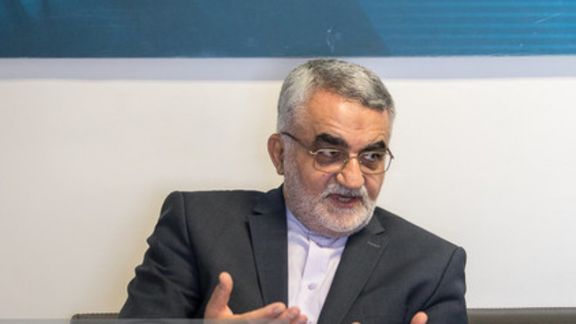
A senior Iranian lawmaker called for strengthening ties with China, Russia, and neighboring countries after Supreme Leader Ali Khamenei rejected the idea of negotiations with the United States.
“We pursue and advance our national issues and interests independently of the United States,” said Alaeddin Boroujerdi, a member of the National Security and Foreign Policy Committee.
“Therefore, it is essential to strengthen our relations with major countries like China and Russia, as well as with our neighboring countries,” Boroujerdi told ISNA news agency.
Khamenei said on Friday that talks with Washington are "neither wise, intelligent nor honorable."
He also said that US withdrawal from the 2015 nuclear deal under President Donald Trump shows Washington is unreliable.
“The Islamic Republic trusted America once, despite the Supreme Leader’s clear distrust. The Americans, however, failed to honor their commitments, even tearing up an agreement backed by a UN resolution,” Boroujerdi added.
He also said Iran’s policies must reflect reciprocity, warning that threats to Iranian national security would be met with countermeasures.
The remarks indicate that hardliners are coalescing around the intransigent take of the Supreme Leader on talks, in opposition to the public desire for talks mooted by the relatively moderate government.
While Iran’s leadership frames its anti-US approach as protecting national sovereignty, the economic toll of sanctions and isolation has taken a heavy toll.
Ordinary Iranians are confronted with worsening standards of living as the US dollar is being exchanged at over 890,000 rials on Saturday, a new record low. Inflation, unemployment, and shortages in critical sectors continue to strain daily life.